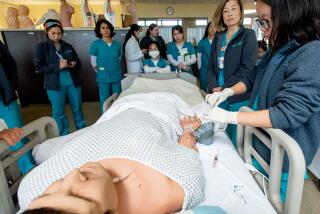College Trustees May Add Classes With Higher Fees : Education: San Diego Community College district considers accelerated courses for students willing to pay.
- Share via
In an effort to ease competition for classes, San Diego Community College trustees are studying a plan to allow students to take accelerated courses by paying increased fees to cover the cost of new class sections.
The idea, which administrators emphasize is still in an early stage, would let the district offer more courses without having to wait for now-scarce state funding, and would free up space in existing courses for more students unable to afford special classroom fees.
Students with the ability to pay a maximum $102 a unit--instead of the state-subsidized $6 a unit--would have the option of taking new intensive classes that would cover in four or five weeks the same material now presented during a normal 18-week semester. A typical class is three units.
The expectation is that such classes would attract students who are able to pay and who want to finish classes as quickly as possible, such as those students from San Diego State University looking to the community colleges for some of their lower-level required courses. By enticing those students into the accelerated courses, semester-long classes would have more room for regular community college students who now find themselves competing for space with SDSU students.
The idea was floated this week for the first time by trustee Fred Colby, who said the district must begin looking for alternatives to state funding in order to avoid having to turn away increasing numbers of students because of a lack of classes.
“We’ve got to get new ideas going here because otherwise” things are going to get worse and worse, Colby said Wednesday.
The district expects to offer 170 fewer classes at its three campuses--Mesa, Miramar and City--when the fall semester begins Tuesday, meaning that as many as 2,000 students may be unable to get the classes they want.
And because of continuing state budget problems, the community colleges could face another cut similar to the 10% reduction made during the current fiscal year.
“I think it’s a very good idea,” board president Evonne Schulze said Wednesday. “Already we’re turning away students. We’ve got to start looking now for other funding before we end up with a disaster. . . .”
Schulze has previously pushed for a way “to open up our facilities more, even on weekends for classes.”
“This would be a way for people who can pay for the luxury of finishing a class or two in a faster way at night, or on the weekend, or late afternoon,” he said.
Trustees at their Monday night meeting asked chancellor Augustine Gallego to talk with college deans, faculty representatives and state community college officials and come back with a detailed report on costs and potential numbers of students.
Gallego said Wednesday that the district’s nonprofit Community College Auxiliary Organization could probably run the classes without the need for any new state legislation.
State law prohibits the community college districts from charging more than the subsidized fees. But the auxiliary, although it uses the same professors and facilities, can run such courses similar to the way it runs the district’s contract education courses, where private companies pay the full cost of special courses designed for their employees.
Any money earned by the auxiliary after expenses and salaries were paid would go back to the community college campuses for use in expanding other course offerings, Gallego said.
“We have the academic experience in doing this,” he said, pointing to the five, six and eight-week intensive sessions that the district offers students during the summer. “This could be another way of providing core courses and better using our campuses without having to have state money.”
He said that no district has taken any moves toward trying any alternative to state funding.
More to Read
Sign up for Essential California
The most important California stories and recommendations in your inbox every morning.
You may occasionally receive promotional content from the Los Angeles Times.













